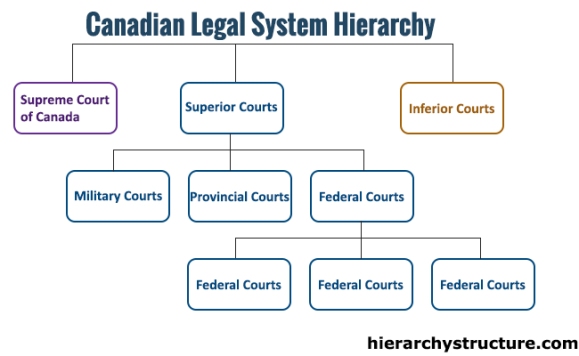The Canadian legal system hierarchy is made up of several courts which differ in their levels of legal supremacy and are separated by the jurisdiction. There are some courts which are federal in nature whereas others are territorial or provincial. In Canadian legal system hierarchy, more or less, all cases whether civil or criminal, begin in provincial courts and can be ultimately appealed to courts of higher level.
The relatively small system of the federal courts hear only cases related to the issues which are under special federal control, like federal administrative agencies, federal taxation, intellectual property and certain facets related to the security of the nation. The Canadian legal system hierarchy is briefly elucidated as below in descending order means starting with the highest level court of the hierarchy and ending with the lowest one:
Supreme Court of Canada – In Canadian legal system hierarchy, Supreme Court is the highest court. The Canadian Supreme Court was constituted in the year 1875 by an act of the Parliament and now it is governed by the Supreme Court Act. This court is a common court of appeal from all the other courts of Canada. Therefore, it has jurisdiction over the disputes in all the areas of law, which includes criminal law, administrative law, constitutional law and private law.
Superior Courts – The common meaning of a superior court is that it is a court of basic jurisdiction. The decisions made by superior courts are not the matter of reperuse, unless a law specially provides for an appeal or review.
- Military Courts – In Canadian legal system hierarchy, military courts are the courts for the appeal of court martial. The court martial is conducted by the military personnel.
- Provincial Courts – Every province in Canada has a lower trial court, generally known as a Provincial Court. These courts are to hear some particular kinds of cases. The appeals from these provincial courts are heard either by superior courts of the territory or by the Court of Appeal.
- Federal Courts – Besides the Canadian Supreme Court, there are three types of civil courts formed by the federal Parliament under its lawmaking authority which are together called as Federal Courts.
- Federal Court of Appeal – The Federal Court of Appeal only hears appeals from verdicts provided by the Federal Court, Tax Court of Canada and a particular group of federal administrative courts.
- Federal Court – The Federal Court subsists mainly to review administrative verdicts by the bodies of federal government and to hear litigations under the jurisdiction of the federal government.
- Tax Court of Canada – The Tax Court of Canada hears disputes especially over federal taxes under the federal income tax act.
Inferior Courts – The lower level courts comes under inferior courts. Many inferior courts have exclusive functions which hear only youth matters, criminal law matters, family matters and small claims matters.

